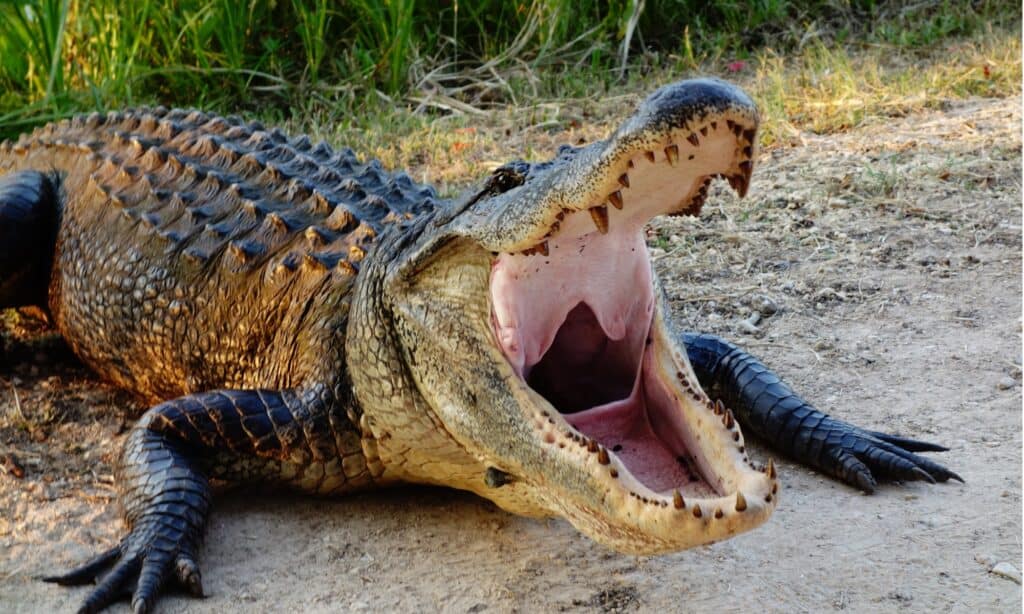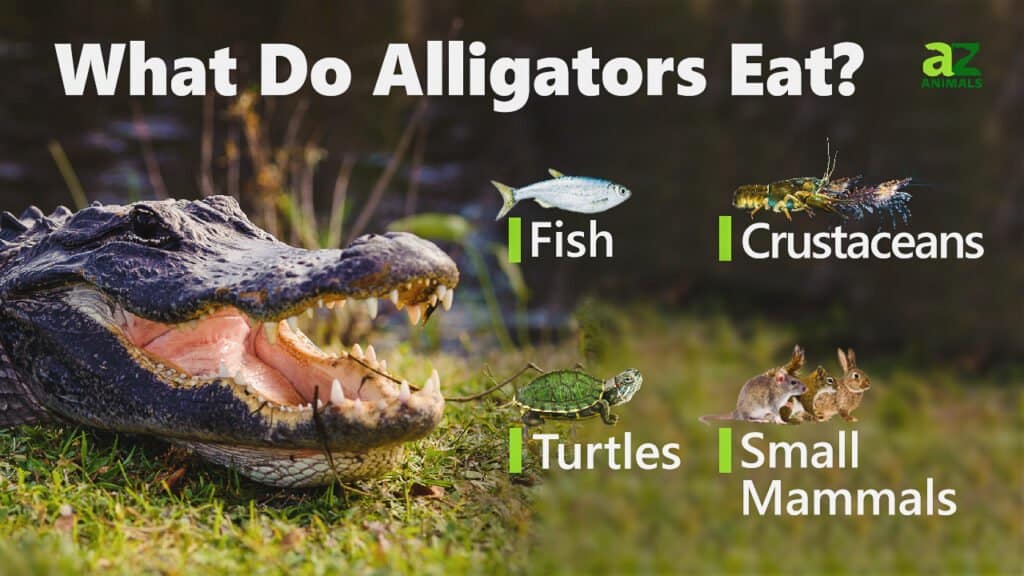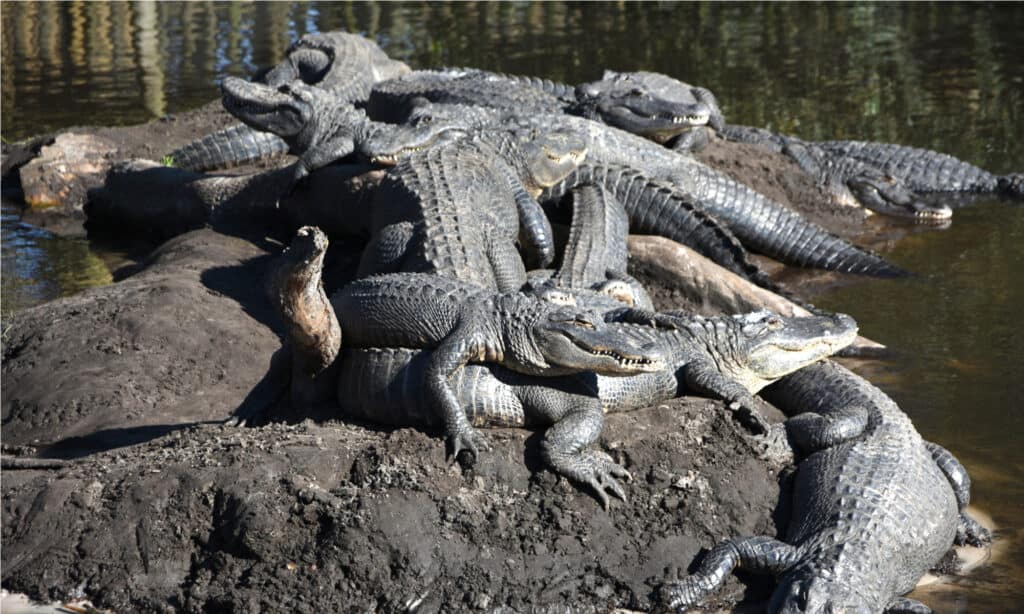Being friendly is normal in the human world, but friendliness isn’t something that is looked forward to in the animal kingdom. Dogs befriending cats is one thing, but wild animals, especially predators, befriending prey is another. In the wild, animals struggle to eat and not be eaten every single day.
Our pets are lucky enough to be served curated food at home, but wild animals have to forage for food themselves, and the most frightening of all, every waking hour is a chance to be devoured. So, friendship between alligators and turtles is quite unlikely. Despite both being reptiles and having the same habitat preferences, the ferociousness of one and the vulnerability of the other make it hard for these two to be friends. So, let’s settle this once and for all: do alligators eat turtles, or are they friendly? This article explores the murky waters of alligator and turtle relationships.
Are Alligators and Turtles Friendly?

Alligators and turtles are not friends.
©iStock.com/Alex Pankratov
The quick answer is no; alligators and turtles are not and would never be friends. Alligators see turtles as an easy target, so the relationship between these two creatures will never go beyond predator and prey. In fact, alligators and turtles typically do not get along well. Turtles can be violent with alligators, and alligators are known to prey on them.
However, pictures showing these two species spending time together in the wild, often with the turtle riding the alligator like two best friends, are easily found by a quick internet search for “alligators and turtles.” After seeing these photographs on the internet, one cannot help but question if alligators prey on these docile semi-aquatic creatures.
Although alligators may seem amicable toward turtles, their feral instincts always take over when they are starving. Alligators and other predators cannot be picky eaters when there is a food shortage in their area since the conditions in the wild are uncertain.
Do Alligators Eat Turtles?

Turtles are, in fact, one of the alligator’s favorite meals. By favorite, we mean the easiest for them to catch. Although gators often prefer fleshy animals like fish, birds, or amphibians, they would not hesitate to go for turtles when the need arises.
Alligators hunt animals that are accessible and plentiful in the wild because they are opportunistic hunters. They will wait for a food chance rather than actively seeking it out like most predators, like lions or wolves, do. Alligators in Florida typically eat insects, fish, snakes, amphibians, turtles, and other small mammals while hiding in the dense wetlands. But that doesn’t mean they wouldn’t pursue a cow if given a chance!
Alligators have even been seen and caught on camera devouring venomous snakes such as the cottonmouth – real proof that alligators will be willing to eat anything on their way, and yes, that means turtles!
Why Do Turtles Ride on Alligators?
Turtles simply ride on alligators for transportation purposes. They also use the alligators to fend off predators when concerned about their protection. In addition, alligators float on the water, so the turtle uses them as a place to soak up the sun. Besides, turtles have a habit of snagging themselves inside of anything.
Turtles would climb onto anything to get out of the water and enjoy the sun; fallen logs, for instance, and it’s unlikely that they could identify an alligator that was still in the water apart from a log. It’s also possible that the turtles are aware of the alligator and are attempting to follow it to catch scraps after it attacks.
However, you did see turtles riding alligators, correct? Oftentimes, alligators have no awareness or consent of the turtles’ actions. The alligator’s body is covered in thick, bony armored scales, preventing them from noticing the hitchhiker’s presence.
Can Alligators Crush Turtles?

Alligators have a bite force of 2,980 PSI.
©Robert Gregory Griffeth/Shutterstock.com
As turtles have these protective shells around their bodies, we may question how alligators can eat them and crush their shells. But we might be forgetting that the alligator possesses one of the strongest bite forces in the world, so there is no doubt that alligators can easily crush the reptile’s protective shell.
While the turtle’s shell deters most predators, massive predators like crocodiles, alligators, and even jaguars may shatter the turtle’s carapace to access its body.
One of nature’s strongest defenses is the turtle shell, which is made of keratin plates that cover and encase the soft flesh of the reptile inside. Turtles depend on their tough shells to ward off predators because they are slow, and most are not great fighters. But while pursuing a meal, several predators are more proficient at shattering a turtle’s shell.
Because they live in the same habitat as turtles, crocodilians are one of the species most likely to prey on our shelled buddies. Alligators and crocodiles are renowned for having strong jaws. Although their closing muscles exert an amazing 2,980 PSI, they have fairly weak jaw release muscles that may be readily overcome by simply holding them shut with your hands.
However, as one video showing an alligator giving up after 15 minutes of attempting to crack the shell of an Eastern river cooter demonstrated, it seems that alligators are not always successful in their attempts to breach turtles’ shells to consume the meat within.
What Other Animals Eat Turtles?
Larger turtles have a better chance of living in the wild than young turtles. However, not all turtles—particularly sea turtles—can tuck their entire bodies in, and any bodily organs exposed can leave them open to attack. In addition to alligators and crocodiles, sharks, dogs, raccoons, snakes, snapping turtles, birds, and killer whales also prey on turtles.
Hatchlings and juvenile turtles can also be easily preyed upon by giant reptiles. The majority of predatory lizards relish eating turtle eggs. For instance, monitor lizards are known to raid flatback turtle nests in search of hatchlings to eat.
Turtle eggs fall into easy prey that skunks frequently search for. The main predators of developing turtles include skunks, opossums, and dogs because they hunt turtle eggs.
The photo featured at the top of this post is © iStock.com/Bradley Proxmire
Thank you for reading! Have some feedback for us? Contact the AZ Animals editorial team.






